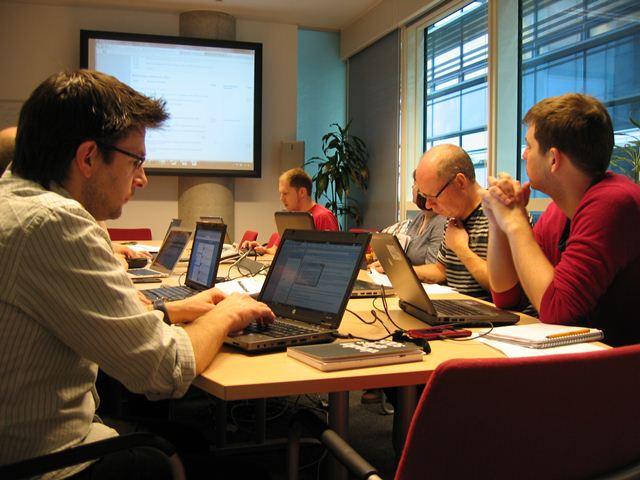After a year predominantly focussed on external SCAPE events (Open Research Challenges Workshop @ iPres, the First SCAPE Training Event in Guimarães) we finally organised another project internal scenario and developer’s workshop. As always, the event provided a great opportunity for developers and SCAPE scenario holders to get together and talk face-to-face. It also gave those new to the project an opportunity to meet some of those people who they’d only spoken to over Skype (or even only over email!).
Flexibility in the workshop agenda enabled each day’s activities to be adjusted slightly so that everyone had opportunity to discuss and gain awareness of important topics at this point in the project. Main topics focused on were the scenario status updates, refining scenarios, policy representation work, and the functional review criteria; enabling team members to have an appreciation of these subjects will be important in helping to improve project-wide understanding and communication, especially as the project steps up integration of the various components we have been working on.
 The first day started by reviewing the existing scenarios. Plenty of excellent work has gone on across the project, and much of this is driven and directed by content holders who express their needs and assess solutions through the various Scenarios. From assessing this list, it was clear that we have a good spread of Scenarios underway, and completing these should form the focus for upcoming work. As it stood at the meeting, across the three TestBeds (Large Scale Digital Repositories, Web Content, and Research Datasets), we have 11 active scenarios, 7 just starting to be worked on, with a further 10 not started, postponed or unknown (2 unknowns due to no feedback before the meeting).
The first day started by reviewing the existing scenarios. Plenty of excellent work has gone on across the project, and much of this is driven and directed by content holders who express their needs and assess solutions through the various Scenarios. From assessing this list, it was clear that we have a good spread of Scenarios underway, and completing these should form the focus for upcoming work. As it stood at the meeting, across the three TestBeds (Large Scale Digital Repositories, Web Content, and Research Datasets), we have 11 active scenarios, 7 just starting to be worked on, with a further 10 not started, postponed or unknown (2 unknowns due to no feedback before the meeting).
Understanding the breadth and status of scenarios helps us understand and prioritise forthcoming work. Combined with the recent gap analysis and the scenario refinement work, which aims to succinctly identify the issue with each scenario and the associated solution’s requirements, it will also help make on-going development work clearer, better directed and easier to measure.
Catherine Jones (STFC) presented an overview of the policy representation work going on within the project. This aims to break down organisational high level policies into low level machine actionable policies which can be monitored and reacted to by the automated watch component (for example, reacting to risks and constraints derived from policies), as well as used by preservation planning to ensure that Preservation Plans meet institutional needs and requirements (for example, using institutional policies to select appropriate plans or components for plans). As a means to understand this better, the group worked on developing example policies for the three defined policy levels (High-level guidance policies, Preservation policies, and Control Level policies) using an existing scenario (TIFF to JPG2000 migration).
On the final day, a couple of demonstrations were given to the group. One focussed on the development of the Component Plugin functionality in Taverna (to enable the creation and use of SCAPE Preservation Components within the Taverna Workbench) and the associated Component Catalogue APIs for storage, access and discovery of these components within the web based catalogue. The second demo was of Matchbox, a tool for detecting near-similar images, for example where one image is a rotation or scaled transformation of another. In particular this demo focussed on the detection of duplicate images from a collection of content, with excellent results.
To wrap things up, Carl Wilson (OPF) gave a presentation surrounding the Functional Coding Review aspects of the project which serves to ensure that the software we produce is of good quality and easily maintainable. He covered many related aspects such as documentation, licensing, unit tests, bug tracking and packaging. He also discussed the need for a team of developers who will be responsible for reviewing code against our coding guidelines (as well as reviewing and iterating the guidelines themselves) – if you can spare some time to help with this, please get in touch.
On the whole the workshop was very successful. Flexible arrangements allowed a lot of important work to be covered, with the participants I spoke to all having positive things to say about this approach and the meet-up in general. Ultimately, the benefits of such flexibility is probably reflective of the fact that it is constructive participation which is important in setting the direction and success of any endeavour.
On this note, if you have a scenario with a scalability challenge which SCAPE should be working on, are able to help with functional review, or have feedback on SCAPE outputs (especially from those external to the project) then please get in touch.

